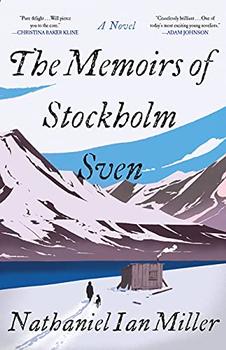Summary | Excerpt | Reviews | Beyond the Book | Readalikes | Genres & Themes | Author Bio

I read all that I could find on the subject: terminally dull voyage narratives—except for Nansen's, of course; he could write—and colorful, mostly fictitious histories, like Southey's Life of Nelson. I had always been an omnivorous reader, disappearing into books for as long as my father would allow, but now I consumed them with a singular, sweaty focus, like an addict reunited with his vice after too long a separation.
On rare days off, I lingered around the Polar Institute. I watched the men coming and going, dapper in their city suits, and tried to visualize them starving in animal skins. Some carried leather satchels, which I imagined were full of arcane charts. Were they explorers? Unlikely. But they were closer to the real thing than I was. They had their hands on a door. Lurking by the front entrance and doing my best to seem disinterested, I tried to catch glimpses of their eyes—wondering if they all contained the same feral agitation that I assumed others found in mine. But I saw nothing of note. Most looked merely impatient or preoccupied. Perhaps that's how a caged animal appears.
I asked my younger sister about this. Olga and I were close. My older sister, Freyja, was a beast who detested me—still resenting, I guess, my original infringement upon her world. Olga, on the other hand, had always been my confidante. She was shy and a bit fragile, but there existed no barrier between her and the truth. I admired this quality about her. She could not dissemble at any cost. My mother worried that this would stand in the way of marriage prospects.
"Olga," I said, when I was perhaps nineteen years old and she seventeen. "Look into my eyes."
"Yes?" she said.
"What do you see?"
She considered the question. "I see nothing."
"Do you not see the slavering desperation of a trussed creature?"
"No," she replied.
"Look again. I know there is an unmistakable tempest."
"Sven, there is not. You are widening your eyes and lifting your brows like a maniac. Please stop."
2
After a few more years of numbing work in a series of mills, my animal caginess had, I thought, been squelched for good and all.
Dull, menial tasks have always generated in me an almost somnolent torpor. My eyelids begin to droop, and my body slows down until it is practically inert. My mind wanders in aimless, dreamlike patterns. This does not make for a good millworker. In an industry that prides itself on efficiency and speed, I was often more of a nuisance than a cog. Regularly I was startled back into wakefulness by the line boss standing over my hunched shoulder and shouting into my ear that I was a "miserable slug." And regularly I was fired. Only because my father was a foreman who had many friends and was well liked did I ever get rehired at different mills. And then the old bastard would lord it over me—yet another magnanimous act, like my very existence, for which I owed him.
I'm quite sure my co-workers, like my father, took for granted that I was slow or queer. Unlike most men of my age and class, I did not spend my free evenings in bars, descending into greasy sub-basements of drunkenness and singing Swedish folk songs. I saved my paychecks and privately gave a small portion of each to my mother. I did not marry or produce children whom I would rarely see. At the end of each day, I went home to my tiny dismal flat and read books about explorers and trappers and Sami reindeer herders. I drank, sometimes immoderately, alone.
When Olga finally married, to a terribly dull but unobjectionable fish merchant—Freyja had been wed at eighteen to a mill foreman nearly as insufferable as herself—I believe my mother finally gave up hope for my brighter future and accepted that I was a benign anomaly: a good boy, but an odd boy.
Of course I had attractions, but they were always far outside of the acceptable parameters for someone of my station: a wealthy barrister's daughter who never once looked at me; a married baker who made the most delicious rolls and always let her fingers brush mine whenever I reached out to pay; and I might as well confess to the cliché, a prostitute, who gave me a venereal disease. Perhaps it is absurd to say that each one took an equally tremendous toll on my heart, when it was the infection that actually brought me closest to death, but I contend that unrequited, or unrequitable, love is more barbaric and murderous than any Viking axman.
Excerpted from The Memoirs of Stockholm Sven by Nathaniel Ian MIller. Copyright © 2021 by Nathaniel Ian MIller. Excerpted by permission of Little Brown & Company. All rights reserved. No part of this excerpt may be reproduced or reprinted without permission in writing from the publisher.
Your guide toexceptional books
BookBrowse seeks out and recommends the best in contemporary fiction and nonfiction—books that not only engage and entertain but also deepen our understanding of ourselves and the world around us.